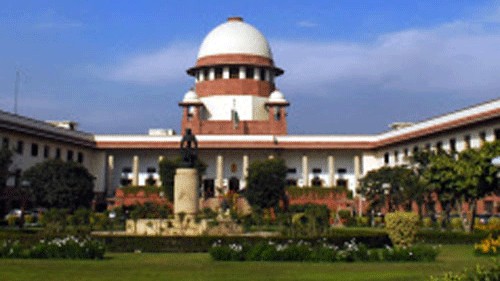
The Supreme Court of India.
Credit: PTI
New Delhi: The Supreme Court on Wednesday expressed its reservation with the Army's policy reflecting the systemic discriminatory practice and predisposition treating HIV as aggravation of STD and AIDS, which is self-inflicted.
A bench Justices Sanjiv Khanna and Dipankar Datta directed the Army authorities to pay a compensation of Rs 50 lakh to a clerk for causing extreme mental agony, concomitant social stigma and looming large death scare to him by misdiagnosing his medical conditions as AIDS.
The court also ordered for payment of full pension as if he had continued in service as Havaldar.
The court noted he was discharged on December 26, 2001 at the prime age of 27, after eight years and 58 days of service and, thus, he was robbed of the opportunity of further serving the nation for many more years on account of most unfortunate turn of events.
"Despite the enactment of the Human Immunodeficiency Virus and Acquired Immune Deficiency Syndrome (Prevention and Control) Act, 2017, and the slew of awareness measures taken by governments in recent times, the stigma and discrimination which lamentably accompanies an HIV+ve diagnosis is still an illness that afflicts the minds of society today," the bench said.
The court said the discriminatory sentiment of deeming persons who are HIV+ve to be unfit for employment, is starkly evident from the way in which the appellant has been responded to and treated by the various authorities.
"By misdiagnosing the appellant with AIDS, the respondents indubitably subjected the appellant to further misery in not only combating social stigma against a disease which the appellant never suffered from but also from the dreadful thought of an imminent death resulting from an incurable disease," the bench said.
The court awarded the monetary compensation to the appellant now 50 years of age for he suffered psychological, financial and physical trauma, and the fact that his reinstatement in service was not an available option now.
Going through the Army policy, the court noted, it reveals that in terms of Para 6A, a person who has been diagnosed as HIV+ve was expected to develop AIDS within 6-8 years, and thereafter, have a limited lifespan of only 1-2 years.
"We cannot help but record reservation as the policy reflects the systemic discriminatory practice and predisposition treating HIV as aggravation of STD and AIDS is self-inflicted," the bench said.
In the case, the court said, the appellant could not be said to be suffering from AIDS since, in flagrant defiance of the policy assessment, the appellant is reportedly still alive and suffering from no serious ailment.
The bench pointed out the authorities here also mechanically denied the appellant's request for disability status in most arbitrary and unreasonable manner.
"It is pertinent to note that in yet another instance of the deep-rooted bias against individuals diagnosed as HIV+ve, the Notice allows for sheltered appointments to those diagnosed with such a condition, while in the same breath stating that the provision of such sheltered appointments is an unlikely possibility," the court said.
